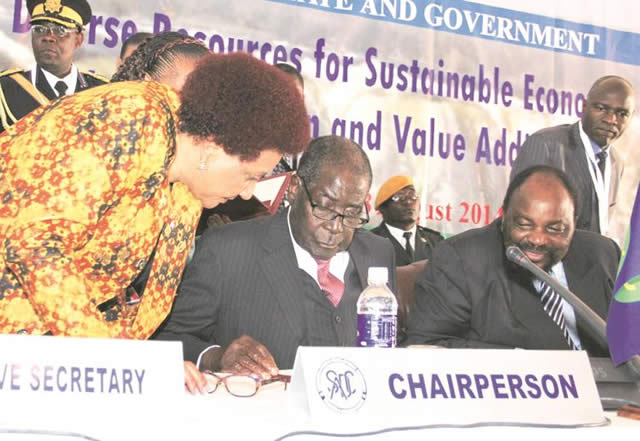Bloc adopts new Protocol on Tribunal


Sadc Chairman and President of Zimbabwe Cde Mugabe signs one of the protocols while flanked by Sadc Executive Secretary Dr Stergomena Lawrence Tax and chairperson of the Sadc Council of Ministers Simbarashe Mumbengegwi in Victoria Falls yesterday.
Patrick Chitumba in Victoria Falls
THE 34th sadc Summit of Heads of State and Government had adopted the new Protocol on the Tribunal to re-establish the bloc’s court that was disbanded in 2010 after Harare protested its biased ruling on the successful land reform programme. The new Protocol on the Tribunal’s mandate would be confined to dealing with inter-state disputes and was signed by regional leaders who included Presidents Jacob Zuma of South Africa, Jakaya Kikwete of Tanzania, Armando Guebuza of Mozambique, Peter Mutharika of Malawi, Joseph Kabila of the Democratic Republic of Congo, Hery Rajonarimampianina of Madagascar, Namibia’s Hifikepunye Pohamba and the new sadc chairperson President Mugabe.
The other protocols signed at the end of the two-day summit are Environment Management for Sustainable Development, Employment and Labour and a declaration on Regional Infrastructure Development.
The protocol on Trade and Services was only signed by Presidents Zuma and Pohamba since the rest of the bloc’s members have already appended their signatures to the Protocol.
The regional leaders disbanded the old Tribunal in 2010 — a development that led to the region negotiating for a new regional court.
The new tribunal thus is significantly and substantially different to the original which allowed individuals to approach the court with their cases against their governments.
The previous Sadc Tribunal courted controversy when it handed down judgments that were in conflict with Zimbabwe’s constitutional position on land reform.
President Mugabe also told the Summit that the Sadc Ministers of Justice and Attorney General had also proposed the establishment of an ad hoc Administrative Tribunal to deal with labour matters between Sadc secretariat and its employees.
“It is indeed a necessary mechanism that will address the grievances of our employees,” he said.








Comments